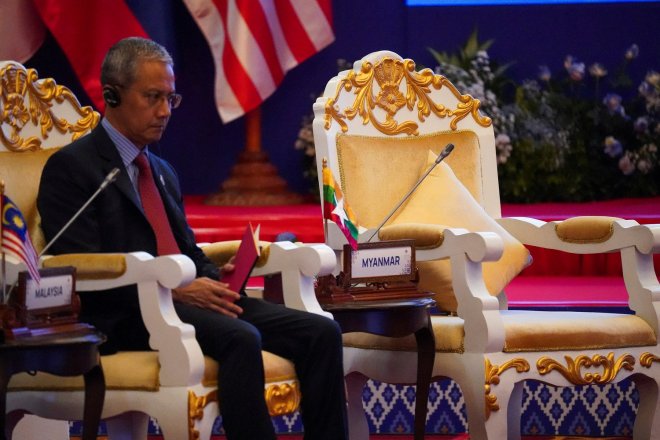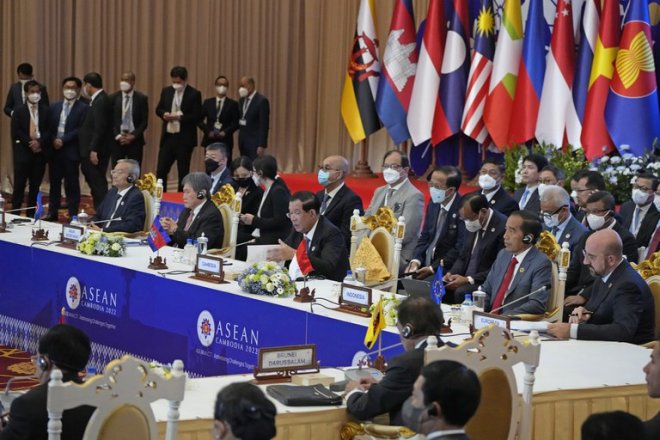
A joint statement issued last week by the Association of Southeast Asian Nations is the strongest to date on resolving member state Myanmar’s political crisis, but should have barred junta delegates from attending its meetings, Myanmar’s shadow government said Tuesday.
On Nov. 13, ASEAN wrapped up its four-day annual summit in Phnom Penh, the capital of rotating chair Cambodia, with a call on the bloc’s foreign ministers to establish a specific timeline for “concrete, practical and measurable indicators” of progress in implementing a peace plan for Myanmar.
The Five Point Consensus, agreed to in April 2021, aims to end violence and restore democracy to Myanmar following the military coup against the elected government, but more than 21 months later, the country’s civil conflict rages on and the death toll continues to climb.
The junta has largely ignored the terms of the consensus despite a chorus of calls from rights groups and NGOs for its leaders to step down from power over what they say are military atrocities in Myanmar’s remote regions and its refusal to negotiate with opposition stakeholders it labels “terrorists.”
Among those stakeholders is the shadow National Unity Government, which on Tuesday applauded ASEAN’s statement, but called for an even stronger course of action against the military regime.
“The ASEAN announcement has used the most effective words so far since February 2021,” Kyaw Zaw, the spokesperson for the office of NUG President Duwa Lashi La, told RFA Burmese, citing the bloc’s call for a timeline and engagement with all parties.
“These are forms of progress. But, in terms of implementation, we haven’t seen any strong action yet.”
ASEAN’s statement, which warned of a “final decision” on the Myanmar issue if the junta failed to meet its obligations on the Five Point Consensus within an agreed upon timeline, also reserved the bloc’s right to review the country’s representation at its meetings based on compliance.
While junta leader Senior Gen. Min Aung Hlaing was excluded from last week’s summit, Kyaw Zaw suggested that ASEAN had dragged its feet on the issue and questioned why it hadn’t barred the military regime from attending all of its meetings.
 Cambodia"s Prime Minister Hun Sen
Cambodia"s Prime Minister Hun Sen
The junta’s Foreign Ministry outright rejected ASEAN’s statement and review of its implementation of the Five Point Consensus in a statement of its own, warning that coercive pressure in the form of a deadline would only lead to “negative consequences,” without elaborating.
Thein Tun Oo, executive director of the Myanmar-based pro-military think-tank Thaynaga Institute for Strategic Studies, composed mostly of ex-military officers, told RFA that ASEAN’s charter prohibits the bloc from violating the sovereignty of its member states.
“If they want genuine and comprehensive cooperation from Myanmar, ASEAN can’t make these kinds of decisions thoughtlessly,” he said, calling the crisis “a roadblock that cannot be resolved politically.”
“In addition, setting a time constraint for implementing the Five Point Consensus is tantamount to interfering with the internal affairs of a member country. It won’t be accepted … [and] we won’t see any results from this approach.”
Thein Tun Oo said he expects that the junta will ignore ASEAN’s resolution and proceed with its own agenda, which includes plans to hold an election in 2023. Critics of the regime say any ballot that does not include the deposed National League for Democracy, which won the country’s November 2020 election in a landslide, lacks legitimacy.
But other observers told RFA that it’s time for ASEAN to stop enabling the junta and take a new tack if it is committed to fostering peace in Myanmar.
“It’s clear from the junta’s response to ASEAN that it will continue its crimes regardless of any pressure from Myanmar’s neighbors,” Patrick Phongsathorn, Human Rights Advocacy Specialist for London-based rights group Fortify Rights, told RFA via email.
One way to do so, he said, is to immediately suspend junta participation in all ASEAN meetings.
“ASEAN member states should now engage with the National Unity Government – the legitimate government of Myanmar – and should take measures to starve the junta of weapons, aviation fuel, resources, and political recognition,” Phongsathorn said.
Meeting with key stakeholders
Political analyst Sai Kyi Zin Soe called on ASEAN to engage with the people of Myanmar to better understand their problems and how they want to be governed.
“If they listen to the people’s wishes and demands, they would be able to see how they could implement the Five Point Consensus,” he said.
“If they don’t meet with the people they should, or leave out key stakeholders, their efforts won’t make any difference.”
Sai Kyi Zin Soe predicted that ASEAN will pursue an informal meeting with Myanmar’s opposition groups, including the National Unity Government, citing the bloc’s calls for “engagement with all parties.”
Analysts say there are clear fault lines among ASEAN’s 10 members on how to deal with the Myanmar crisis – with Indonesia, Malaysia and Singapore reportedly taking a tougher line than nations such as Thailand, Cambodia and Laos.
In a statement over the weekend, the National Unity Government signaled its readiness to cooperate with ASEAN if called upon to do so.
With Indonesia next in line to take the ASEAN chair at the start of next year, such a scenario appears increasingly likely.
Translated by Ye Kaung Myint Maung. Written by Joshua Lipes.